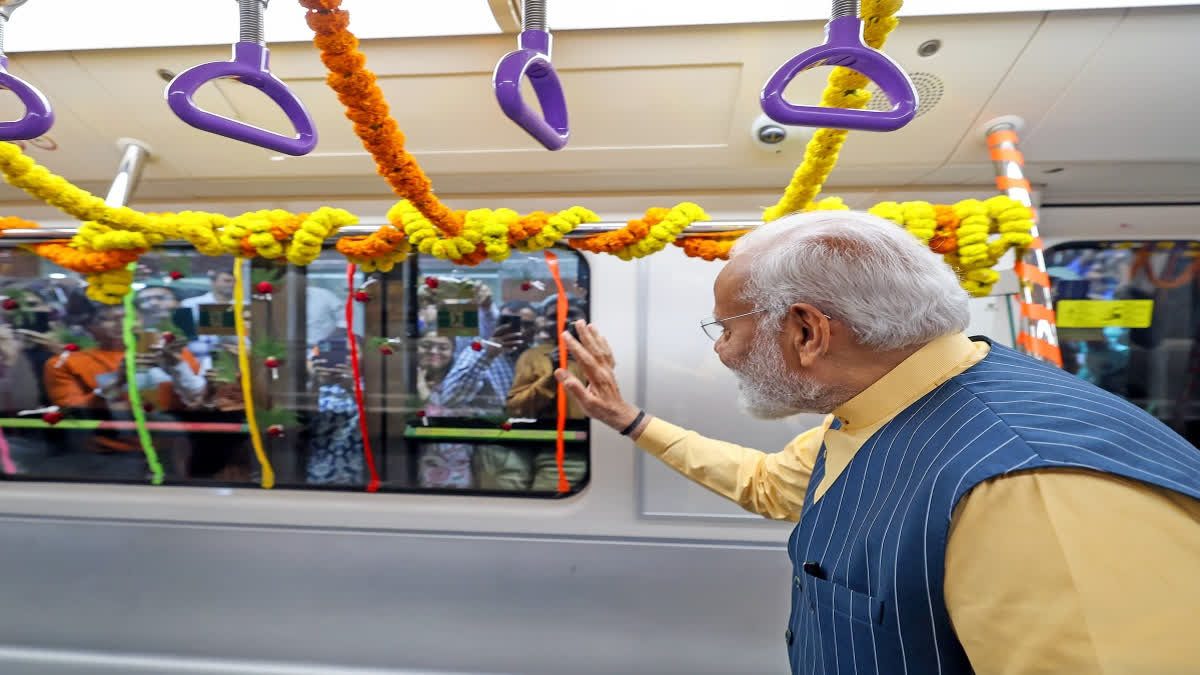New Delhi: The Regional Rapid Transit System (RRTS) corridor in 82 km long Delhi-Ghaziabad-Meerut is likely to take over one lakh private vehicles off of the road and expected to reduce 2,50,000 tonnes of carbon dioxide in vehicular emissions per year, senior officials of National Capital Region Transport Corporation (NCRTC) said.
Puneet Vats, Chief Public Relations Officer, NCRTC said, "With Namo Bharat Trains driven by electric traction, RRTS is the greenest mode of transport in the National Capital Region (NCR). Once operational, the Delhi-Ghaziabad-Meerut corridor will take more than one lakh private vehicles off the roads."
To encourage commuters travelling by personal vehicles to switch to Namo Bharat Trains without sacrificing comfort, the provision of a premium coach is provided in every such train. The spacious and comfortable premium coach will be equipped with cushioned reclining seats with charging points for mobile and laptops provided at every seat to facilitate uninterrupted work and entertainment for commuters, Vats said.
According to NCRTC officials, implementation of the RRTS corridor is expected to shift the modal share in favour of public transport from 37 per cent to 63 per cent in the region, which ultimately helps in curbing pollution. Increased share of public transport will reduce dependence on private vehicles and will lead to less congestion on roads resulting in a reduction in accidents.
Multi-modal integration is the core principle of RRTS implementation. To encourage the use of public transport, RRTS stations are being seamlessly integrated with the existing modes of public transport like bus stands, airports, metro stations and railway stations wherever possible, they added.
RRTS is a long-term strategic intervention by the Centre and four state governments, Delhi, Haryana, Uttar Pradesh and Rajasthan, for decongestion of the national capital, reducing vehicular congestion and air pollution, and enabling the balanced and sustainable development of the region, the NCRTC officials added.
"Due to savings in fuel and reduction in air pollution, carbon credit would be generated during the operation of the RRTS corridor. These stations are planned in a way that they are connected to the existing modes of public transport wherever possible and are being built as close as possible to them. It will facilitate convenient and smooth travel for commuters by public transport and last-mile connectivity for commuters in the NCR. It will encourage more and more people to switch to public transport,” NCRTC officials pointed out.
With an intent to promote the use of public transport facilities, NCRTC will provide extensive parking facilities to the commuters of Namo Bharat trains along the entire corridor from Delhi to Meerut.
"More than 8000 vehicles will be accommodated in the parking spaces being developed at RRTS stations. This will not only significantly reduce the load of private vehicles on the Delhi-Meerut route, but also save road accidents and help in reducing air pollution," Vats added.
It is understood that NCRTC is also working on providing various options of last mile connectivity to the commuters and an expression of interest for providing various types of feeder services on all 25 stations has recently been invited.
In addition, NCRTC is also planning to install battery-swapping stations in its parking areas for both commuters and last-mile service providers. This initiative will promote sustainable modes of transport at a pocket-friendly cost for commuters. The battery-swapping stations will not only encourage the use of electric vehicles but also enhance last-mile connectivity for people.
